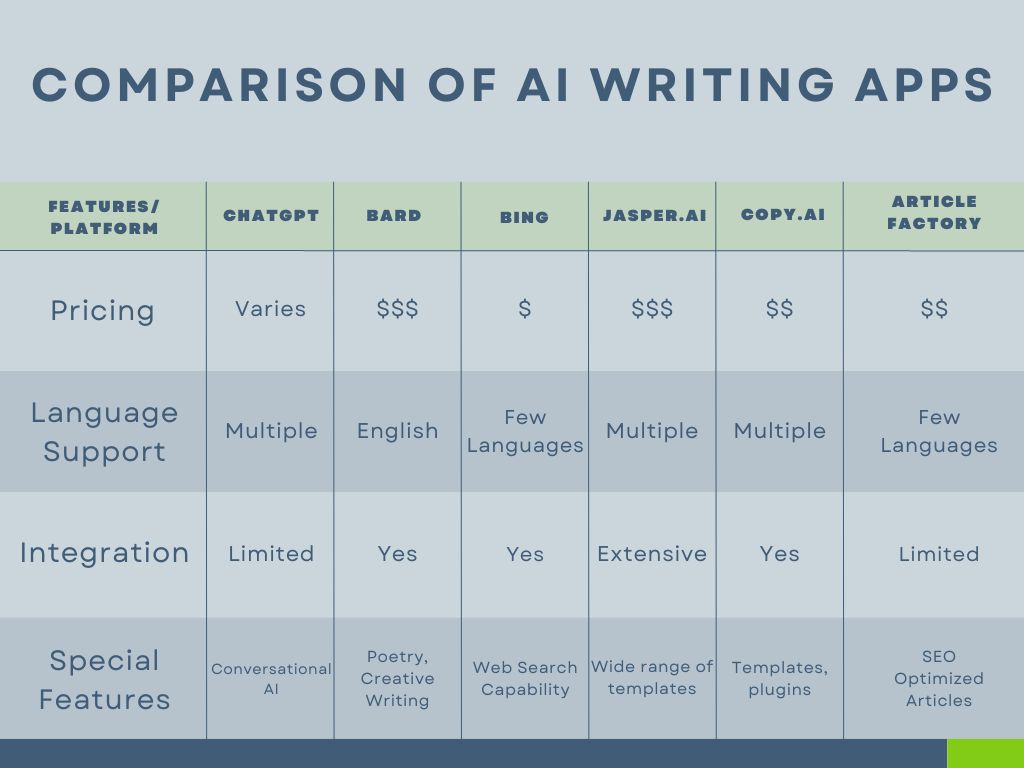
Ultimate Guide to AI Copywriting: A Comprehensive Comparison of Leading Tools
Contents Overview:
- Understanding AI Copywriting
- Who Can Reap Benefits from AI Copywriting?
- AI Copywriting Best Practices
- Top 6 AI Copywriting Platforms for 2023
- Frequently Asked Questions about AI Copywriting
The landscape of content creation is rapidly changing, with AI copywriting tools making a splash, from versatile content generators to innovative ecommerce chatbots. The allure? Their ability to significantly trim down time and cut costs. Who doesn’t appreciate that?
However, the real magic happens when these tools are in skilled hands. Mastery over when to utilize AI copywriting versus when to tap into genuine human intellect is crucial. Dive into this guide and discover 6 leading AI copywriting tools designed to elevate and streamline your marketing strategies, all while preserving the irreplaceable human touch.
1. What is AI Copywriting?
AI copywriting is the use of artificial intelligence systems to generate written content. It involves the application of machine learning models like GPT-4 to understand human language and create written material that can range from blog posts and social media updates to marketing emails and more.
2. Who can benefit from AI Copywriting?
- Marketers and Social Media Managers: For rapid content generation, ad copies, or engaging social media posts.
- Business Owners: To help draft business emails, website copy, or product descriptions without hiring a dedicated content writer.
- Writers: For brainstorming, getting past writer’s block, and generating content ideas.
- Students: For note-taking, essay writing, or research purposes.
- Others: SEO specialists, bloggers, journalists, etc.
3. Best Practices for AI Copywriting::
Avoid Over-reliance: Always review and edit AI-generated content.
- Provide Clear Inputs: The clearer and more specific your prompts, the better the output.
- Stay Ethical: Do not use AI to plagiarize or mimic another writer’s unique style.
- Hallucinations: Hallucinations refer to the perception of something as real when it is not actually present. It can occur in any sensory modality — visual, auditory, tactile, olfactory, or gustatory.
How to Avoid Hallucinations:
- Stay Medically Informed: Some medical conditions, such as migraines, brain injuries, or Parkinson’s disease, can lead to hallucinations. Regular check-ups can help in early detection and management.
- Avoid Substance Abuse: Drugs like LSD, marijuana, cocaine, and even alcohol can cause hallucinations. It’s essential to steer clear of illicit drugs and consume legal substances responsibly.
- Maintain Good Sleep Hygiene: Chronic sleep deprivation can lead to visual and auditory hallucinations. Ensure you’re getting adequate, quality sleep.
- Manage Stress: Chronic stress or traumatic experiences can sometimes lead to hallucinations. Practice relaxation techniques such as meditation, deep breathing exercises, and progressive muscle relaxation.
- Medication Adherence: If prescribed antipsychotic medications, it’s crucial to take them as directed to manage conditions like schizophrenia effectively.
- Limit Isolation: Prolonged isolation can sometimes contribute to hallucinations. Stay socially connected.
- Seek Immediate Help: If you or someone you know starts experiencing hallucinations, it’s vital to consult a healthcare professional immediately for a proper assessment and intervention.
4. Importance of Doing the Creative Work Yourself:
While AI can assist and amplify, the essence of creativity stems from human experiences and emotions. Your unique voice, perspective, and creativity are irreplaceable. AI should be seen as a tool to complement, not replace, human creativity.

Pros and Cons:
- ChatGPT
- Pros: Highly versatile, conversational AI.
- Cons: Might require a learning curve.
- Bard
- Pros: Great for creative writing.
- Cons: Limited to mostly English.
- Bing
- Pros: Integrates with web search.
- Cons: Not primarily a content generation tool.
- Jasper.ai
- Pros: Wide range of templates and document types.
- Cons: More expensive than some competitors.
- Copy.ai
- Pros: User-friendly, wide integrations.
- Cons: Generic outputs sometimes.
- Article-factory.ai
- Pros: SEO-optimized articles.
- Cons: Limited language support.
AI Copywriting FAQs:
Q1: Is AI copywriting replacing human writers?
- Answer: No, AI assists writers but can’t replace the creativity, emotion, and unique voice of humans.
Q2: How accurate is AI-generated content?
- Answer: While AI can generate grammatically correct content, it’s always best to review for context and accuracy.
Q3: Is AI-generated content considered plagiarized?
- Answer: AI generates content based on trained data. It’s essential to check outputs for originality, especially in academic or professional settings.
Q4: Can AI understand and write in any language?
- Answer: While many AI tools support multiple languages, the depth of understanding might vary.
Unlock the power of AI-driven content with Article Factory! 🚀 Create your FREE account now and enjoy up to 2,000 words per month on us. Elevate your content game today.